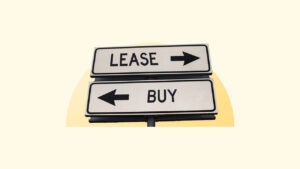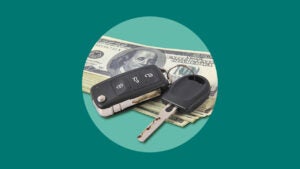Should you lease or buy an electric car? Top 9 considerations




Key takeaways
- Leasing an electric vehicle (EV) allows you to test out the driving experience without committing to full ownership.
- A lease will often have a lower monthly payment than an auto loan, and some leasing companies will offer an upfront discount that covers the federal tax rebate.
- Buying an electric car can be a better option for drivers who want full ownership and the ability to modify their vehicle, but it may come with a higher upfront cost and potentially steep depreciation.
- The choice between leasing and buying an EV ultimately depends on personal preferences and financial considerations.
The number of options for getting behind the wheel of an electric vehicle has grown dramatically over the years. The most recent data from Experian’s quarterly State of the Automotive Market report found that EVs account for 11.36% of new purchases and just over 25% of all new leases. In addition, a recent survey by Verra Mobility found that in 2025, nearly half of Americans plan to purchase an EV within the next five years.
But even as available electric vehicle models multiply and interest in driving them increases, choosing and shopping for your first EV can be daunting. Leasing an EV can be the right first step for those who aren’t sure how an EV will fit into their lifestyle. Buying an EV is generally best suited for drivers who know what they want and are ready to commit.
Is it better to lease or buy an electric car?
As EV options have expanded, more drivers have decided to lease — over 55% in the third quarter of 2025, according to Experian. About 31% chose to finance with an auto loan instead of leasing. Either route you take, EVs may offer a positive driving experience for you and the planet and are a strong consideration for your next car.
| Leasing an EV is better if | Buying an EV is better if |
|---|---|
| You want to stay within the manufacturer’s warranty. | You want to have full ownership of the vehicle. |
| You want a lower monthly payment. | You don’t want restrictions on how far you can drive. |
| You want to stay up-to-date on the newest tech. | You qualify for full federal tax credits. |
When does leasing an electric car make sense?
Leasing a vehicle makes the most sense when you aren’t sure if you want an EV or if you prefer the typical short-term benefits of a lease.
Manufacturer warranty
While leasing, your vehicle will still be covered by its manufacturer warranty. This could help you save thousands of dollars on expensive repairs, including replacing the battery.
Lower monthly payment
Leases tend to have lower monthly payments than auto loans — an average of $175 less on top models, according to Experian. You can use a lease calculator to determine how much it will cost in total to lease instead of buy.
This is because your payments are only based on the duration of the lease and the expected sale price when the lease period is up. In addition, you could avoid a large down payment, although this could mean a higher monthly payment.
Latest technology and battery
While changes to conventional internal combustion engine (ICE) vehicles are not dramatic, the EV market is advancing much faster. Leasing allows you to be on the cutting edge of available technology. When it comes to battery, charge life and other features, leasing an EV allows you to upgrade to a more efficient vehicle every few years.
While the average credit score for purchasing a new internal combustion vehicle has decreased three points to 750, the average credit score for purchasing a new EV has risen to 769.
Drawbacks of leasing an electric car
EV or otherwise, leasing of any kind comes with some notable downsides that you should consider.
- No equity: Just like with any other lease, leasing an EV leaves you without equity when the lease ends. Since you have to give back your vehicle, everything you paid up to that point can’t be recouped. You won’t be able to use the vehicle as a trade-in, and you cannot get back the money you put down.
- Difficult to end early: Leaving a car lease is not easy or inexpensive. If you do not like the vehicle you lease, you will likely be expected to pay hefty fines to exit the lease agreement. Depending on your lessor, you may be expected to pay out the residual value in addition to remaining lease payments and fees.
- Vehicle restrictions: When signing off on an auto lease, there are a few main aspects to look out for: mileage, maintenance and vehicle modification. If you lease your EV, you will likely be limited to driving anywhere from 12,000 to 15,000 miles a year. You will also have to foot the bill for vehicle maintenance and cannot customize the vehicle.
You can always buy out your lease and then drive it longer or use it as a trade-in. But these routes aren’t guaranteed to recoup the costs of leasing a vehicle.
When does buying an electric car make sense?
Having full ownership of your vehicle will ensure you aren’t checking the odometer every time you drive, but there are other benefits to consider as well.
Full ownership
Depending on where you stand financially, buying an EV can allow you to pay off your loan at your own speed and place you in total control of your vehicle. You will have a firm grasp on your total cost upfront instead of worrying about potential wear-and-tear or mileage overage charges that can add up at the end of a lease.
No restrictions or limits
If you feel that the freedom of the open road should not be restricted, then buying an EV might be a better option for you. This way, you will not be held captive by the vehicle’s odometer and can enjoy driving and modifying your car as much as you want.
Potential tax incentives
When purchasing an EV, you can benefit from a multitude of financial incentives. The federal EV tax credit, worth up to $7,500 dollars for new models and $4,000 for used models, is ending September 30, 2025. But many states still offer rebates to lower the cost of purchasing a climate-conscious vehicle.
If you decide that purchasing is the right move for your needs, be sure to compare auto loan rates to secure the best rate.
Drawbacks of buying an electric car
Buying an EV can cost you more upfront, and with rapid tech changes, ownership carries some clear downsides. This is why buying an EV makes sense if you can afford it. These vehicles tend to cost more than their gas-powered counterparts. And while the lifetime cost can be lower, the immediate monthly and ongoing costs should be your first consideration. EV ownership is also fitting for drivers who have done their research and understand how vehicle range fits into their driving habits.
- Expensive upfront cost: Electric vehicles tend to be more expensive than conventional vehicles. A new EV averages $55,544, according to Cox Automotive. EV drivers also tend to carry almost identical credit profiles to those financing luxury cars and pay large down payments, according to a TransUnion report. This can make getting approved for a loan more of a challenge for borrowers with less-than-perfect credit scores.
- Rapidly changing tech: Innovation in the electric car field is rapid, and that growth is the downside to buying. You won’t be able to take advantage of upgrades unless you sell your car and buy a new one — which can be an expensive route. Advancements in battery life and changing charger standards may make leasing a better option.
- Potentially steep depreciation: That same changing tech could also lead to steep depreciation. If the car you buy now is no longer being produced in a few years, it could lose much of its value. In addition, companies, like Tesla, slashing prices on their models means that you could pay tens of thousands of dollars more for a car than it will be worth in just a few months.
Bottom line
For some, the benefits of the newest available tech may outweigh the lack of full ownership — while, for others, getting behind the wheel of a vehicle with confidence and incentives makes more sense.
If you decide to buy an EV, do your research to understand the additional costs associated with ownership and take advantage of green auto loans. On the other hand, leasing an EV requires the same attention as leasing a gas vehicle. Review a few offers and understand the contract before committing to a lease.
Why we ask for feedback Your feedback helps us improve our content and services. It takes less than a minute to complete.
Your responses are anonymous and will only be used for improving our website.
You may also like

Pros and cons of leasing vs. buying a car

Buying an electric car could save you money


